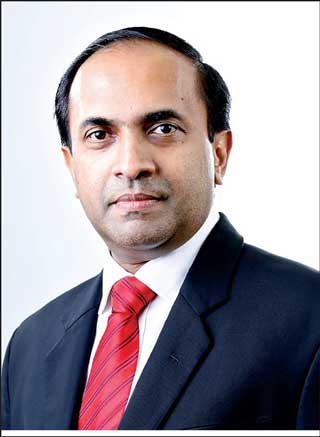Thursday Feb 19, 2026
Thursday Feb 19, 2026
Monday, 1 November 2021 00:00 - - {{hitsCtrl.values.hits}}

The Colombo Stock Exchange (CSE), the only authorised stock exchange in Sri Lanka, is significantly investing in transforming the CSE into a world-class exchange. The CSE is optimistic about Port City Colombo and the benefits it will bring to the capital market. Colombo Stock Exchange CEO Rajeeva Bandaranaike and Head of Origination and Issuer Relations Purasisi Jinadasa Colombo Stock Exchange outline their aspirations for Port City Colombo in this interview:
 |
| CSE CEO Rajeeva Bandaranaike |
 |
| CSE Head of Origination and Issuer Relations Purasisi Jinadasa
|
Q: The Colombo Stock Exchange (CSE) recently entered into a MoU with Port City Colombo (PCC) to establish a regionally recognised stock exchange within the Port City. What is the need for establishing a new stock exchange alongside the CSE?
Rajeeva: An offshore exchange established within the Port City Colombo will enable the development of a more vibrant financial eco-system, which will have a trickle-down effect on the wider economy over time. Port City Colombo’s favourable policies, including zero exchange controls and preferential tax policies, among others, will enable the development of more complex and innovative financial services targeting a more sophisticated global client base. These preferential policies within the Port City Colombo will attract global financial institutions and their
High-Net-Worth clients (HNIs), spurring the growth of a wider eco-system within the PCC – on par with the best global financial centres.
Q: Discussion on capital markets is often limited to the asset class of equities. How do you envision this regional exchange to be a home for corporate debt markets, REITs, etc.? Have you identified the potential for any other instruments?
Purasisi: An offshore exchange will place us on a more level playing field with other global financial centres. A key advantage we have is that we are at the initial stages of execution, giving us the flexibility to create the right environment for up-and-coming changes within the global financial system. We will have standard markets for equity, debt and various asset-linked securities; however, we are also evaluating the potential of fostering a financial technology hub. Given the growing shift towards and acceptance of novel types of digital assets, we could potentially emerge as a legitimate global hub for such assets.
Q: Will this envisioned regional exchange benefit only foreign issuers? What opportunities does this present to local companies for raising capital in the global arena?
Purasisi: There is significant opportunity for local companies, particularly those that cater primarily to foreign clients or derive a majority of earnings from foreign sources. These companies may encounter limitations when raising capital via the onshore exchange. An offshore exchange will provide these companies with the freedom to raise capital at more realistic valuations, while entrepreneurs in highly innovative sectors (such as tech) may find it more viable too.
Q: What advantages does Sri Lanka and particularly the legal and regulatory environment at Port City Colombo present in positioning a regional exchange to develop a competitive international financial centre?
Rajeeva: No exchange controls and a preferential tax system are strong incentives. Additionally, zero-taxes on employment income, the ability to be remunerated in a foreign currency and freedom of movement for foreign labour, create a foundation to attract global talent. Additionally, we will have the ability to create rules and regulations that will promote the structured development of innovative products and services. Sri Lanka is an attractive destination, situated close to large economies that can drive the success of Port City Colombo. Competing on a global scale to attract talent is not an easy proposition, however our natural resources, hospitality and the availability of a wide variety of diversions catering to all tastes, are all significant advantages.
Q:The SEC Bill is a current point of discussion in the corporate world. Is this Bill relevant in developing a regional exchange?
Rajeeva: Port City Colombo provides an atmosphere conducive to creating the right rules and regulations to support and foster a vibrant offshore capital market. Therefore, we are confident that the regulator will design and maintain rules and regulations that promote sustainable development of the financial sector.
Q: Various geo-political issues and regulatory issues are increasingly driving “unicorns” and other high growth companies in the Asian region to seek listings outside their home markets. How can Sri Lanka position attractively for these companies?
Purasisi: An offshore exchange is an attractive proposition primarily for the following reasons: The unrestricted flow of capital, very low fees and low or no taxes; flexible rules and regulations designed to compete effectively with global financial centres; presence of world class financial and ancillary services.
Thus, we must strive to maximise these factors, which we can do through the Port City Colombo model. We are looking to partner with a global exchange in this venture, which will enhance our proposition and profile, and position Sri Lanka as an ideal offshore destination for raising capital.
Q: For the development of successful capital markets, ancillary sectors such as investment banking, accounting and legal services, etc. should also be developed. Have you studied the strengths and weaknesses of the current state of these sectors to address opportunities for the future?
Purasisi: Our success is dependent upon the vibrancy of the broader ecosystem within Port City Colombo. The presence of an exchange alone will not lead to success. However, we are confident that Port City Colombo, with the support of its stakeholders, can attract the right global players and talent, which in turn will help to create a top-tier ancillary services sector.
Q: The CSE is currently undertaking the second phase of its transformational digitalisation drive. With an exchange focused on more advanced markets, what aspects could be introduced going beyond this second phase?
Rajeeva: The introduction of DVP (Delivery vs. Payment) is a significant step towards reducing settlement risk and improves investor confidence. DVP also now enables us to introduce more innovative financial instruments. Going forward, the next major milestone is finalising the demutualisation process, placing the CSE in a better position to graduate into the emerging market category, increasing interest among foreign institutional investors.
However, the importance of establishing an offshore exchange within Port City Colombo cannot be overstated. If successfully executed, the benefits will positively impact the onshore exchange and the wider economy.